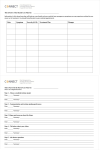A cluster randomized trial of a primary palliative care intervention (CONNECT) for patients with advanced cancer: Protocol and key design considerations
- PMID: 28104470
- PMCID: PMC5331884
- DOI: 10.1016/j.cct.2017.01.005
A cluster randomized trial of a primary palliative care intervention (CONNECT) for patients with advanced cancer: Protocol and key design considerations
Abstract
Background: The addition of specialty palliative care to standard oncology care improves outcomes for patients with advanced cancer and their caregivers, but many lack access to specialty care services. Primary palliative care-meaning basic palliative care services provided by clinicians who are not palliative care specialists-is an alternative approach that has not been rigorously evaluated.
Methods: A cluster randomized, controlled trial of the CONNECT (Care management by Oncology Nurses to address supportive care needs) intervention, an oncology nurse-led care management approach to providing primary palliative care for patients with advanced cancer and their family caregivers, is currently underway at 16 oncology practices in Western Pennsylvania. Existing oncology nurses are trained to provide symptom management and emotional support, engage patients and families in advance care planning, and coordinate appropriate care using evidence-based care management strategies. The trial will assess the impact of CONNECT versus standard oncology care on patient quality of life (primary outcome), symptom burden, and mood; caregiver burden and mood; and healthcare resource use.
Discussion: This trial addresses the need for more accessible models of palliative care by evaluating an intervention led by oncology nurses that can be widely disseminated in community oncology settings. The design confronts potential biases in palliative care research by randomizing at the practice level to avoid contamination, enrolling patients prior to informing them of group allocation, and conducting blinded outcome assessments. By collecting patient, caregiver, and healthcare utilization outcomes, the trial will enable understanding of the full range of a primary palliative care intervention's impact.
Keywords: Behavioral intervention; Caregiver; Cluster randomization; Oncology nursing; Primary palliative care; Quality of life.
Copyright © 2017 Elsevier Inc. All rights reserved.
Figures
References
-
- Teunissen SC, Wesker W, Kruitwagen C, de Haes HC, Voest EE, de Graeff A. Symptom prevalence in patients with incurable cancer: a systematic review. Journal of pain and symptom management. 2007;34(1):94–104. - PubMed
-
- Breitbart W, Bruera E, Chochinov H, Lynch M. Neuropsychiatric syndromes and psychological symptoms in patients with advanced cancer. Journal of Pain and Symptom Management. 1995;10(2):131–141. - PubMed
-
- Hotopf M, Chidgey J, Addington-Hall J, Ly KL. Depression in advanced disease: a systematic review Part 1. Prevalence and case finding. Palliative medicine. 2002;16(2):81–97. - PubMed
-
- Northouse LL, Katapodi MC, Schafenacker AM, Weiss D. The impact of caregiving on the psychological well-being of family caregivers and cancer patients. Seminars in oncology nursing. 2012;28(4):236–245. - PubMed
Publication types
MeSH terms
Grants and funding
LinkOut - more resources
Full Text Sources
Other Literature Sources
Medical



